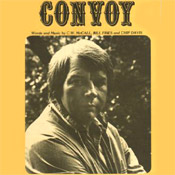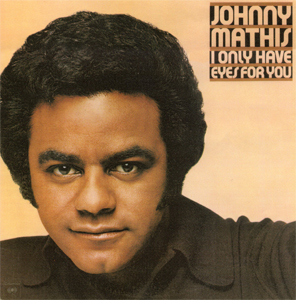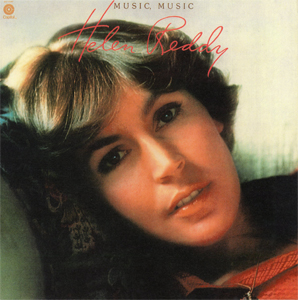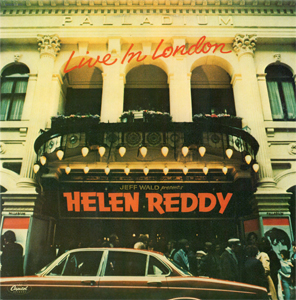Related Research Articles

William Dale Fries Jr. was an American commercial artist who won several Clio Awards for his advertising campaigns. He was also a musician remembered for his character C. W. McCall, a truck-driving country singer that he created for a series of bread commercials while working for an Omaha advertising agency as an art director. Fries performed as McCall in a series of outlaw albums and songs in the 1970s, in collaboration with co-worker Chip Davis who also founded Mannheim Steamroller.

"Convoy" is a 1975 novelty song performed by C. W. McCall that became a number-one song on both the country and pop charts in the US and is listed 98th among Rolling Stone magazine's 100 Greatest Country Songs of All Time. Written by McCall and Chip Davis, the song spent six weeks at number one on the country charts and one week at number one on the pop charts. The song went to number one in Canada as well, hitting the top of the RPM Top Singles Chart on January 24, 1976. "Convoy" also peaked at number two in the UK. The song capitalized on the fad for citizens band (CB) radio. The song was the inspiration for the 1978 Sam Peckinpah film Convoy, for which McCall rerecorded the song to fit the film's storyline.

"(Get Your Kicks on) Route 66" is a popular rhythm and blues song, composed in 1946 by American songwriter Bobby Troup. The lyrics relate a westward roadtrip on U.S. Route 66, a highway which traversed the western two-thirds of the U.S. from Chicago, Illinois, to Los Angeles, California. The song became a standard, with several renditions appearing on the record charts.
James Wesley "Jay" Huguely was an American stage actor, singer, advertising executive, and television writer and executive. He enjoyed a brief run of popularity as a novelty recording artist in the 1970s, billed as Cledus Maggard & the Citizen's Band. He worked for Leslie Advertising in Greenville, South Carolina and enjoyed his only hit in 1976 with "The White Knight", released during the wave of popularity of the citizens' band radio. The song is about a truck driver victimized by a Georgia highway patrolman's speed trap. He chose the name "Cledus" after his mother's name Cleta.

"Roll On (Eighteen Wheeler)" is a song written by Dave Loggins, and recorded by American country music band Alabama. It was released in January 1984 as the first single and title track to the band's album Roll On. It was the group's 12th straight No. 1 single on the Billboard magazine Hot Country Singles chart.
"The White Knight" is a novelty country music song made famous by Jay Huguely, who - recording as Cledus Maggard & The Citizen's Band - enjoyed a brief run of national popularity with the song when it became popular in 1976.
"Silver Threads and Golden Needles" is a country song written by Dick Reynolds and Jack Rhodes. It was first recorded by Wanda Jackson in 1956. The original lyrics, as performed by Jackson, contain a verse not usually included in later versions, which also often differed in other minor details.

"East Bound and Down" is a song written by Jerry Reed and Deena Kaye Rose, and recorded by Reed for the soundtrack for the film Smokey and the Bandit. The song features Reed on the lead vocal, and vocalist Gordon Stoker of the Jordanaires on the harmony vocal. It was released in August 1977 as a single on RCA Records. The song's lyrics tell the basic plot line of the movie of making a 28-hour round-trip run from Atlanta, Georgia, to Texarkana, Texas, and back to illegally transport 400 cases of Coors beer for an after-race celebration.

The Great Songs from "My Fair Lady" and Other Broadway Hits is the fifteenth studio album by American pop singer Andy Williams and was released in September 1964 by Columbia Records, one month before the premiere of the film version of My Fair Lady starring Audrey Hepburn.

"Sweet Music Man" is a song written and recorded by American musician Kenny Rogers. It appears on his 1977 album Daytime Friends, from which it was released as the final single.

You Lay So Easy on My Mind is the thirty-fourth studio album by American pop singer Andy Williams, released in November 1974 by Columbia Records. The idea for this LP was mentioned in an interview with Williams in the November 3, 1973, issue of Billboard magazine that emphasized his desire to move away from recording albums of Easy Listening covers of hits by other artists, noting that he was "planning an album to be cut in Nashville with Columbia's high-flying country-pop producer, Billy Sherrill." The article coincided with the release of his first attempt to shift directions, Solitaire, which performed poorly. A return to the Easy Listening hits formula, The Way We Were, followed in the spring of 1974 but failed to even chart, so this next attempt to eschew soft rock songs leaned heavily on Country hits.

Andy is the thirty-sixth studio album by American pop singer Andy Williams, released in the fall of 1976 by Columbia Records. Williams is not as focused on covering pop hits and standards on this album and instead relies mainly on original or lesser-known songs. In the liner notes for the album's 2002 CD release, writer Richard M. Erickson explains that the album "was recorded at six different studios to accommodate Andy's touring schedule. One recording session was at a portable studio set up at a Marriott hotel."

Feelings is an album by American pop singer Johnny Mathis that was released on October 20, 1975, by Columbia Records and strayed slightly from the singer's usual practice of covering hits by other artists by including two new songs, both written by Jerry Fuller: "Hurry Mother Nature" and "That's All She Wrote", which Ray Price took to number 34 on the Country chart the following spring.

I Only Have Eyes for You is an album by American pop singer Johnny Mathis that was released on May 10, 1976, by Columbia Records and included two new songs, "Yellow Roses on Her Gown" and "Ooh What We Do", which was written specifically for him, as well as a contemporary arrangement of the 1934 title track that foreshadowed his recordings of standards that incorporated a disco beat a few years later.

Music, Music is the eighth studio album by Australian-American pop singer Helen Reddy that was released in the summer of 1976 by Capitol Records and later described by J. Scott McClintock for AllMusic: "There are breezy, Bacharach-ian excursions, bluesy numbers, light country ('Mama'), jazzy ballads, and even a little Philly soul. On August 2 of that year the Recording Industry Association of America awarded the album with Gold certification for sales of 500,000 copies in the United States.

Ear Candy is the ninth studio album by Australian-American pop singer Helen Reddy, released on 25 April 1977 by Capitol Records. The album included a modern take on the doo-wop genre, a Cajun number that gave the Melbourne native her first and only appearance on Billboard magazine's Country chart, and a dark self-parody on which Reddy proclaims: "I don't take no shit from nobody". Unusually, half of the songs recorded for Ear Candy were co-written by Reddy herself, including the second single, "The Happy Girls", Reddy's first self-penned A-side single since "I am Woman". The album's first single, a remake of the 1964 Cilla Black hit "You're My World", gave Reddy a final Top 40 hit.

Live in London is the first live album by Australian-American pop singer Helen Reddy that was released in 1978 by Capitol Records and, as with her previous release, did not reach Billboard magazine's Top LP's & Tapes chart. On June 25, 2002, the album was released for the first time on compact disc.

"9,999,999 Tears" is a 1976 hit single by Dickey Lee. The song was written and originally recorded by American country music artist Razzy Bailey. Originally entitled "9,999,999 Years", it was released as a non-album single in 1966 but did not reach the charts.

"C.B. Savage" is a gay-themed novelty country song by the American singer-songwriter Rod Hart, from his album Breakeroo!. It peaked at #67 on the Billboard Hot 100, giving him his only entry on that chart. It was also the first of only three songs with the title "Savage", along with "Savage" by Megan Thee Stallion and Beyonce and "Savage Love" by Jason Derulo and Jawsh 685.

Happiness is a studio album by American country music artist Margo Smith. It was released in April 1977 via Warner Bros. Records and was produced by Norro Wilson. The album contained ten tracks that mixed country and pop arrangements, according to one critic. Four singles were released off the record, including the major hits "Take My Breath Away" and "Love's Explosion." The album itself also reached charting positions following its release.
References
- 1 2 Whitburn, Joel (2008). Hot Country Songs 1944 to 2008. Record Research, Inc. p. 183. ISBN 978-0-89820-177-2.
- ↑ "Gay ballad is joined by 'savage'". Billboard. Vol. 88, no. 46. November 13, 1976. p. 54.
- ↑ Adams, Greg. Allmusic review of Hart's album Breakeroo!
- ↑ Whitburn, Joel (2004). The Billboard Book Of Top 40 Country Hits: 1944–2006, Second edition. Record Research. p. 154.
- ↑ Joel Whitburn's Top Pop Singles 1955–1990 – ISBN 0-89820-089-X
- ↑ "Item Display – RPM – Library and Archives Canada". Collectionscanada.gc.ca. February 12, 1977. Retrieved January 4, 2019.